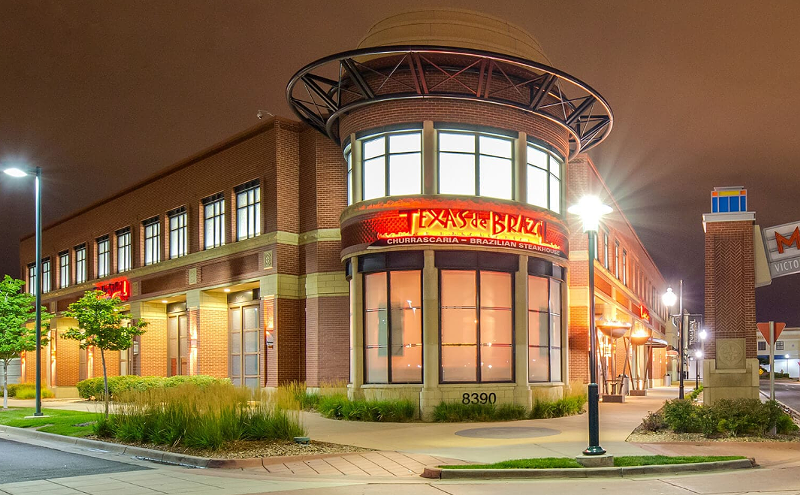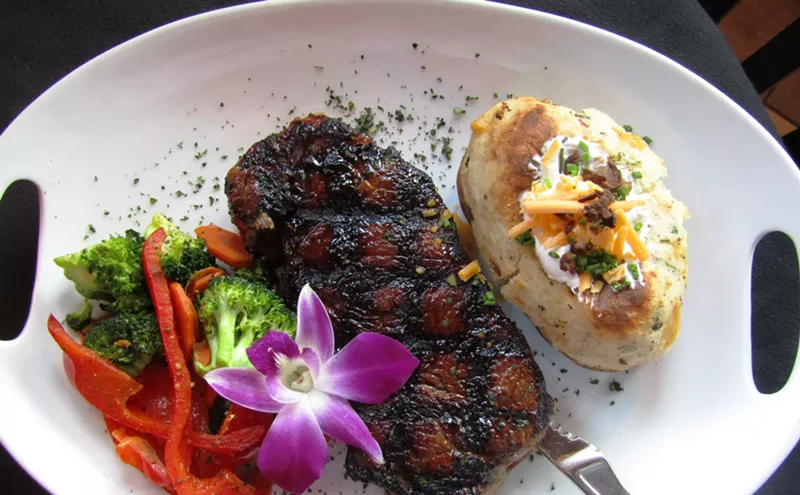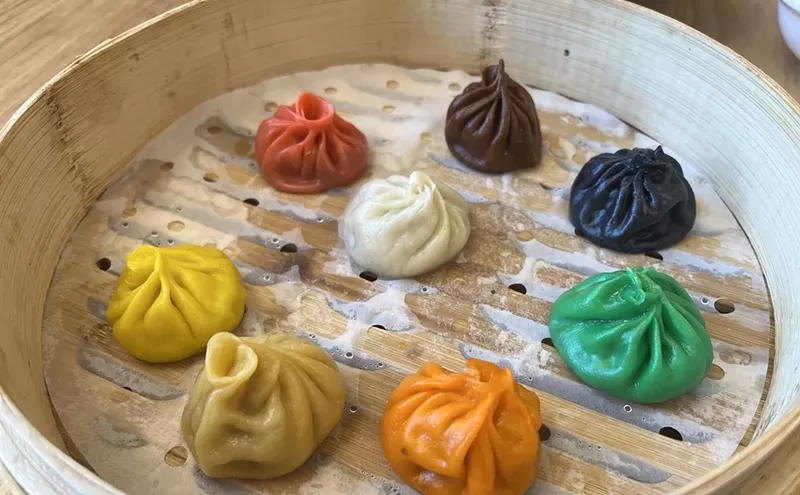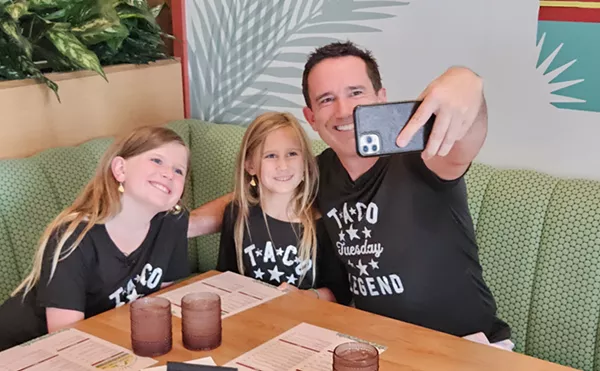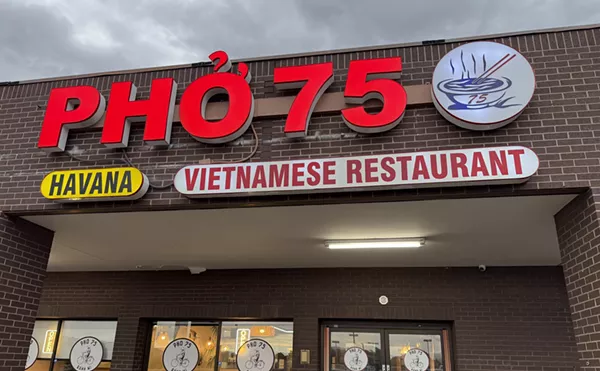I asked the first uniform I saw what had happened.
In the movies, when the plucky young reporter asks the gruff crime-scene investigator what went down, the gruff crime-scene investigator always hitches up his Hagar wrinkle-free slacks and lays down some plot exposition about the former-detective-turned-serial killer or the ace of spades that the crook left at the scene. He then tells the plucky young reporter, "Jimmy, you'd better just leave this one alone." The plucky young reporter is always named Jimmy. He always has a spiral notebook and a pencil stub behind his ear. And then Jimmy goes on to solve the crime, have sex with Sharon Stone or Julia Roberts and win a Pulitzer Prize -- all before the credits roll.
Rarely, if ever, is the plucky young reporter a restaurant critic who showed up late, just looking for some Turkish food. And when I asked the investigator what was going on, he brushed right past me.
"Robbery," he said, and walked away, fussing with his rubber gloves.
This is why movies are better than real life.
Had I been on time -- had I not stuck it out on my couch watching The Simpsons for an extra few minutes -- I would have been waiting on my first order of kebabs and reading the newspaper at Istanbul Grill when the two men came in and demanded money out of the register. I would have been there when Karaoglu and Kapci fought back and put one of the men down while his chickenshit partner ran. I would have been there -- no doubt still hiding under the table -- when the police arrived.
But I wasn't.
In the parking lot, I asked Karaoglu if everyone was okay. No customers had been in the place when the robbers came in; he had some bruises, and his sister-in-law stood cradling her arm -- a nasty egg on her elbow where she'd been hit. But they were alive, and he was pissed that one of the crooks had gotten away.
The next day, I called Karaoglu to get more details.
"They just came in and got some money out of the register," he told me. Two guys, with a gun. They'd gone into the liquor store across the lot, bought some Dutch courage, then hit Istanbul. The one who ran off did so with three or four hundred dollars from Istanbul's till. The other one left in the back of a police car.
"We just fought, and I put him down," Karaoglu said, matter-of-fact as anything.
Although they'd closed the restaurant for the rest of the night, Istanbul was open again for lunch the next day, and he was expecting a good dinner. Just business as usual.
As for me, see what perpetually being late gets you? While I ended up eating take-out Chinese that Monday night, I'll take watching a Simpsons repeat over a robbery any day.
Mail call: Two interesting letters arrived at Bite Me World HQ this week. "I can tell by your name, Jason, that you are a 'JJC' or 'Johnny Just Come,'" was the baffling start to a missive from DS in Pennsylvania, who went on to complain that my review of Yanni's Greek Taverna ("On the Lamb," April 13) failed to note that "Greek food is the same as Turkish food, just different names. I have actually been thrown out of Greek restaurants for using the Turkish names, e.g. doner kebab for gyro, whilst ordering."
Although it's cool that DS was reading a Denver restaurant column in Pennsylvania, I'm with the restaurant owners on this one. Walking into a Greek joint and ordering in Turkish is pretty much the same as walking into a Vietnamese spot and demanding Thai food or stepping to the counter of a Georgia chicken shack and asking for a Kansas City-style pan-fry. Yes, Turkish food and Greek food are similar -- but they're not the same (for proof, see my review of Istanbul Grill). I could go off here on a whole gastronaut jag about the transmigration of cooking styles and the historic placement of certain pantry staples across the globe, but regular readers already know that there are three things in this world that fascinate me: chefs, the movie Buckaroo Banzai and the way geography, politics and history -- all the wars and immigrants and scarcity and excess -- have shaped the way people eat.
Yes, doner kebab and gyros are both made out of spiced lamb (and often some other stuff) pressed and sliced thin over pita. But that's because both Greece and Turkey are prime spots for raising sheep, and taking all the leftover bits of a spring lamb that didn't get turned into roasts and shanks and whatnot and grinding it into the equivalent of a Mediterranean hamburger is a way to get the most out of every animal slaughtered for food. If Greece and Turkey were overrun by cows, they would've come up with the cheeseburger long before Denverite Louis Ballast did.
What's more, doner is just the basic recipe for Turkish lamb. Add some yogurt and a tomato and you've got iskender -- one of the Turks' great contributions to world cuisine. Like the Greeks, the Turks have olive trees, but they also grow cabbages, so they make cabbage dolmas. And while a large portion of the Greek canon concerns fresh seafood, in those fishermen's taverns on the Bosporus, the Turks have fifty-odd recipes just for hamsi, better known as the humble anchovy. In the west of Turkey, the food has more in common with Georgian and Armenian home cooking than it does with Greek. And in the south, where Turkey borders Syria, Iran and Iraq, the flavors shade over into the Middle Eastern.
Similar but not the same: That's the key to deciphering world cuisines. A people may stop at their own borders, but food does not. Which is why I still believe that all matters of international diplomacy should be solved by winner-take-all Iron Chef-style cooking competitions, and all meetings of world leaders should be well-catered and have an open bar. It's tough to hate the guy across the table when you're both facedown in a bowl of dumplings.
In the second letter, Scott offered a strategy for taking on Denver's chain restaurants. "I have an idea for the promotion of 'ma and pa' or local restaurants," he wrote. "An Anti-Chain Restaurant Fund. The idea is simple. It is a sort of reverse Starbucks concept. The fund will pick a selection of chain restaurants and place 'ma and pa' local restaurants, serving the same style of food, right next to it. The restaurant will be provided with funding, promotion, etc. Think of it! Next to every KFC there will be a locally owned, authentic Southern fried-chicken joint. I think this would be a more effective way to encourage people to eat 'locally' than to just tell them to."
In theory, Scott could have a good idea. Well, not even in theory, really, but maybe in a utopian environment where the playing field was level and bank drafts grew on trees, it might work as well as my idea for an all-cotton-candy restaurant that gives free samples to food writers.
There are two reasons successful chain restaurants do the kind of business they do. First, they're capitalized up the wazoo: A strong chain operation has investors just waiting to throw money at the concept. Second, they thrive on uniformity. The reason people go to Olive Garden and not, say, Luca d'Italia is because when most people want fettuccine alfredo, they want it to taste the same every single time. They don't want to take a chance on going somewhere the fettuccine alfredo might taste different -- even if it might taste better.
As for the "Anti-Chain Restaurant Fund," I just hope Scott knows some people with very deep pockets. I asked Tom Bird, owner of Pho Fusion, at 8800 East Hampden Avenue, about the idea, because Bird is sitting on a local concept as close to solid gold as it gets. Pho Fusion offers fast-casual, healthy, reasonably priced Vietnamese food for the masses. It's the Chipotle of noodle bowls, the kind of place you'd want next to every P.F. Chang's on earth. And Bird himself is a very smart businessman who knows exactly what he's doing when it comes to branding and execution.
He laughed when I explained the fund proposal to him. He laughed a lot. And then he started talking business. It cost him roughly a quarter of a million dollars to open his Pho Fusion -- and that's just buildout. That's "working skinny," in his words, and just what it cost to get the doors open in a less-than-desirable location in a building that he doesn't even own. "Look," Bird explained. "I'm in a C location, right? This building is older than you and I put together." If you're trying to compete with a serious chain restaurant in a good location, you can assume that it will cost more than half a mil right off the top just to set up shop next door. And, as Bird pointed out, "Mom-and-pops don't have the triple-A credit that Starbucks does."
Still, let's say that Daddy Warbucks comes through with ten million dollars that would allow the Anti-Chain Restaurant Fund to open (but not operate) five independent restaurants next door to five chain restaurants. Those independent restaurants still need to get people in their door rather than that of the KFC next door, then sell them an authentic Southern-fried chicken for five or six dollars a plate, and stay in business long enough to pay off the original opening investment before a single dime starts coming back in profits. From the start, they'll be handicapped by the fact that KFC buys all its supplies and product in a volume that's inconceivable to independent business owners -- thereby receiving huge volume discounts from suppliers (which is how they're able to sell five-dollar chicken in the first place) -- and benefits from hundreds of thousands of dollars of marketing money that KFC's parent company, Yum! Brands, coughs up every week. People think chicken, they think of the Colonel. They're not thinking of Scott's Discount Chicken Shack. And it's going to take a lot to change their minds.
Sorry, Scott. If you launch your financial suicide mission, I swear I will carry you on my shoulders through Belmar and laud you as a conquering hero -- but I don't think your odds are good. Instead, the best guerrilla tactic is to put your money where your mouth is. Eat locally -- at places like Instanbul Grill, Pho Fusion and Luca d'Italia -- and spend with conscience. Support those places that are already doing it on their own, suffering with big-box neighbors and competing against giants every day. It may seem like a losing battle, but it's not lost yet.
Leftovers: On May 8, Mel and Jane Master will welcome new chef Chad Clevenger (ex of the Coyote Cafe in Santa Fe) at Mel's (235 Fillmore Street). Actually, Clevenger is already working at Mel's, but for the next two weeks, Tyler Wiard is still in command, standing his post to see that the transition goes smoothly before he moves a few blocks away to take over the kitchen at Elway's.
Meanwhile, at Harry's Chop House (2115 East 17th Avenue), chef-owner Frank Bonanno has finally found the right guy to run the line: Corey Treadway (ex of Solera), with whom he worked for four years back when Bonanno was the big dog at Mel's.



